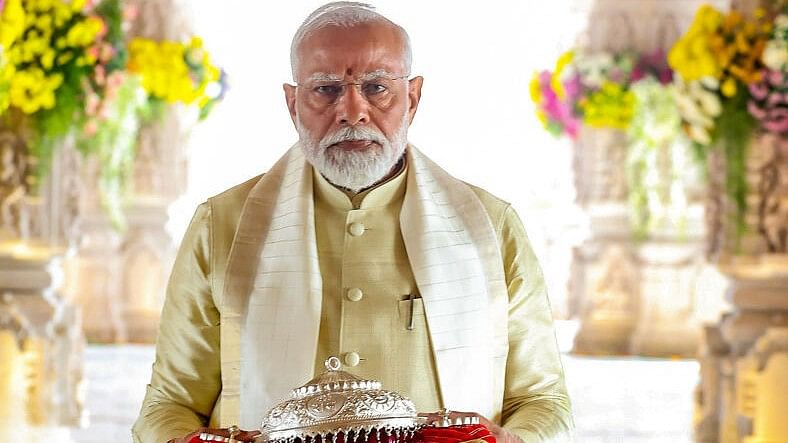
Prime Minister Narendra Modi at the 'Pran Pratishtha' ceremony of Ram temple, in Ayodhya.
Credit: PTI Photo
By Dan Strumpf and Swati Gupta
Prime Minister Narendra Modi’s opening of the Ayodhya Ram temple on Monday blurred the lines between religion and politics in a way that challenges India’s secular tradition. Yet it’s left few doubts of the leader’s unquestioned dominance just months before an election.
At the consecration of the Ram temple — built where the Babri masjid stood— Modi performed a series of rituals in a religious ceremony whilst guided by a priest. He ended the rituals by prostrating himself in front of a 4-foot (1.2 meter) statue of the Hindu god Ram, beamed live to tens of millions of viewers across the country.
In the weeks running up to the event, TV stations and newspapers ran footage of Modi praying at temples, taking ritual baths and fasting.
“He’s not there as a congregant. He’s not there as a pilgrim,” Gilles Verniers, a senior fellow at the Delhi-based Centre for Policy Research, said by phone. “He’s there as a religious figure. And that, I think, is a departure.”
Also Read: Ayodhya Ram Mandir: Faith, Fervour, Furore
Monday’s ceremony combined religion and politics in a fashion that breaks with much of Indian political tradition — yet has shown to be wildly popular with sections of the electorate. There were celebrations across the country with neighbourhood watch parties, impromptu fireworks and festivities as several states marked the event with a last-minute public holiday.
Indians are also buoyed by an economy that is one of the world’s fastest growing and a stock market that just overtook Hong Kong as the world’s fourth-largest. It’s another advantage that Modi and his Bharatiya Janata Party enjoy ahead of national elections likely to kick off in April. The ruling party won decisive victories in key state elections in December and the political opposition is on the defensive.
“The only way the current government will fall is if they do serious missteps,” Shumita Deveshwar, chief India economist at TS Lombard, said by phone. “The opposition is clearly lost for any strategy for how to combat this juggernaut.”
Also Read: Ram Rajya in Amrit Kaal - A new sun rises, a son returns home
The Ram temple ceremony marked the completion of one of the most significant items on the to-do list of the BJP, which for decades has promised to build a temple on a site that Hindu devotees believe to be the birthplace of the deity Ram, and where they say a Hindu temple once stood.
Hindu activists destroyed the mosque in 1992, resulting in nationwide riots in which thousands, mainly Muslims, were killed. Construction on the temple began in 2020, a year after the Supreme Court handed a Hindu trust ownership of the land.
Critics of Modi say the temple project has exploited India’s divisions and marginalized Muslims and other minorities, while eroding India’s tradition of secularism and pluralism dating back to its independence in 1947.
According to the most recent census, Hindus comprise 80 per cent of India’s population, while Muslims account for around 14 per cent. Yet a 2021 Pew Research Center study found that around two-thirds of both Hindus and Muslims see themselves as very different from each other, and the two groups don’t often mix.
“What is the future of India as a pluralistic society?” Verniers asked. “There are very few voices today to openly speak in deference of the notion of pluralism in which citizens of different religious affiliations would share equal rights.”
There was little in the way of meaningful pushback against Modi and his consecration of the temple this week. Foreign observers largely remained quiet during Monday’s event, while a handful offered words of congratulation.
Modi’s political opposition, led by the Indian National Congress, didn’t release any official statement surrounding the ceremony, though many opposition leaders declined to attend the event.
Mamata Banerjee, chief minister of West Bengal, led a “harmony rally” across the city of Kolkata, criticizing the Ayodhya ceremony for ignoring the “tragic deaths across the country” sparked by the mosque’s destruction.
Without a stronger opposition movement coalescing in the coming months, the BJP was headed for a win comparable to the last two elections, each of which handed Modi victories by considerable margins, said Neelanjan Sircar, an author and also a senior fellow at the Centre for Policy Research.
“If there are big changes or barring something certainly coming together for the opposition, I would say we are very much looking at numbers similar to 2014 and 2019,” Sircar said by phone.